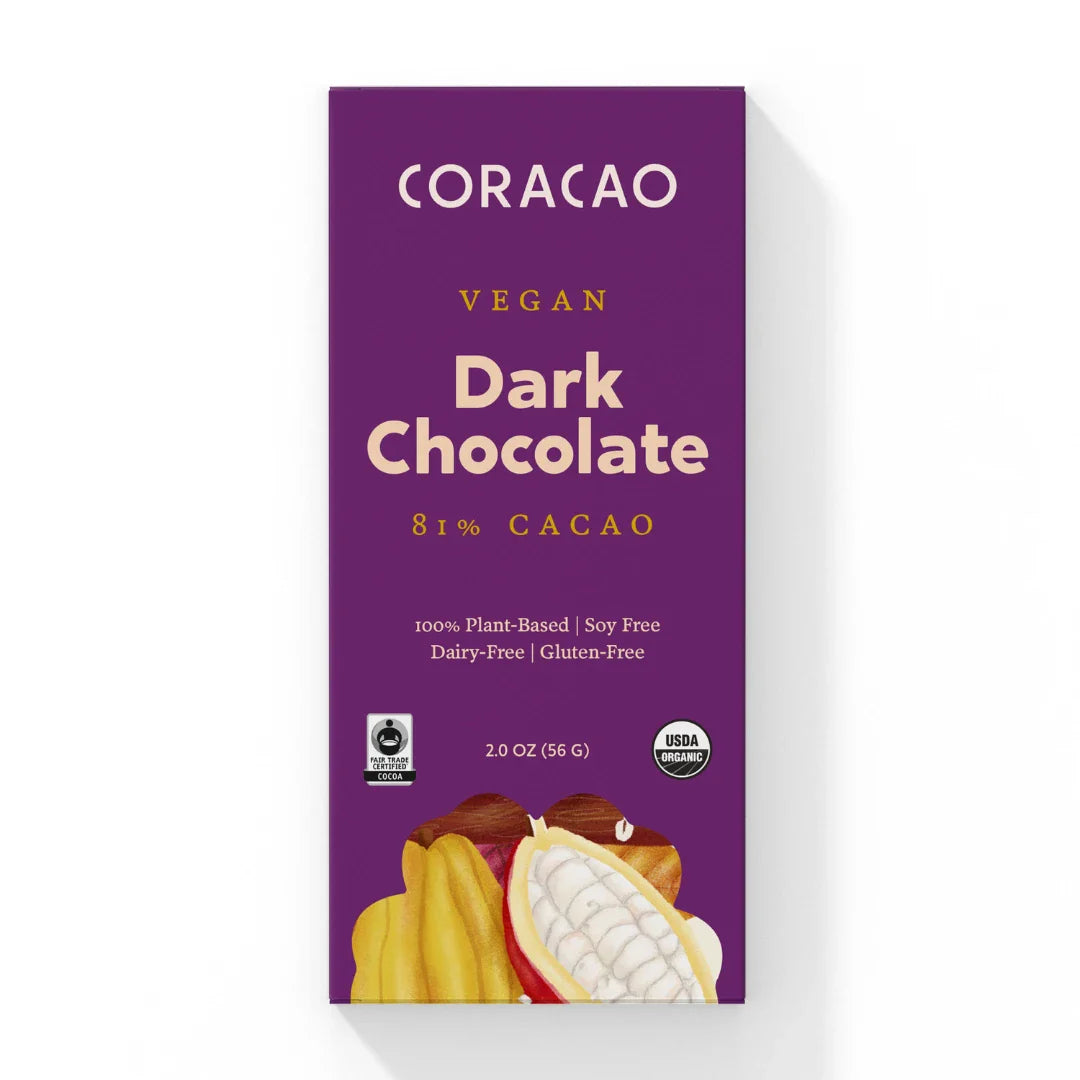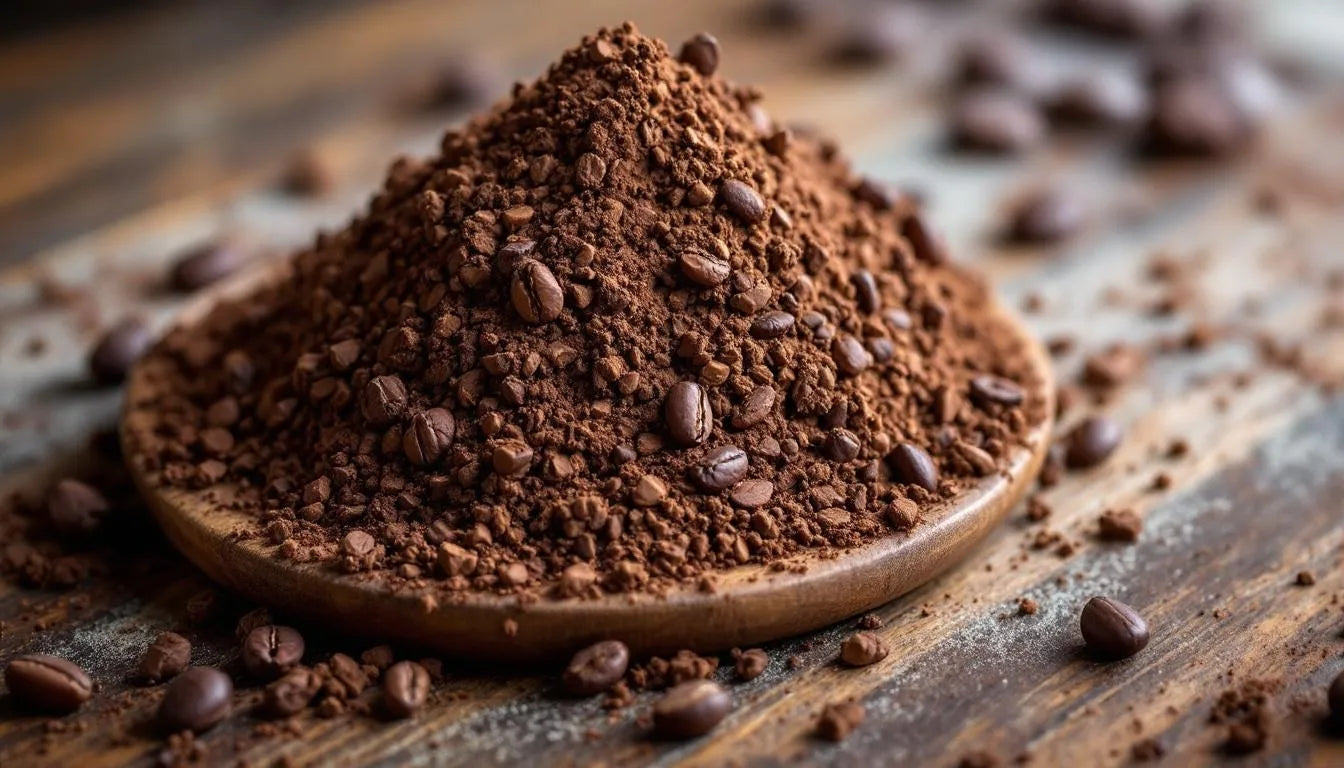
Is Black Chocolate Vegan? Your Complete Plant-Based Chocolate Guide
If you're following a vegan lifestyle, you might wonder whether black chocolate (also known as dark chocolate) fits your dietary choices. The answer isn't straightforward: while black chocolate can be completely vegan, many commercial varieties contain animal-derived ingredients or are processed using animal products. Understanding how to identify truly vegan black chocolate requires knowing what ingredients to avoid and which brands prioritize plant-based production. Let's explore everything you need to know about enjoying black chocolate on a vegan diet.
Understanding Black Chocolate vs. Dark Chocolate
What Is Black Chocolate?
Black chocolate typically refers to very dark chocolate with high cacao content (usually 70-90%+), sometimes called "extra dark" or "ultra dark" chocolate. The term is used interchangeably with dark chocolate in many regions, referring to chocolate with minimal added milk products.
Key Characteristics:
- High cacao percentage (70-95%)
- Intense, complex flavor
- Lower sugar content
- Naturally darker color
- Often marketed as premium chocolate
Our organic chocolate bars represent true black chocolate – rich, dark, and naturally plant-based with cacao percentages that deliver authentic chocolate intensity.
The Vegan Potential
Pure black chocolate should only contain:
- Cacao beans or cacao liquor
- Cacao butter (naturally vegan)
- Sugar (check source)
- Vanilla (ensure plant-based)
- Lecithin (specify soy or sunflower)

Common Non-Vegan Ingredients in Black Chocolate
Direct Animal Products
Milk-Derived Ingredients:
- Milk powder or milk solids
- Whey protein
- Casein
- Lactose
- Milk fat or butter
Other Animal Products:
- Honey (used as sweetener)
- Shellac (confectioner's glaze from lac beetles)
- Carmine (red coloring from insects)
- Bone char (used in sugar processing)
Hidden Animal-Derived Ingredients
Ambiguous Terms:
- "Natural flavors" (may contain animal derivatives)
- Vitamin D3 (often derived from sheep's wool)
- Certain emulsifiers (may be animal-derived)
- Processing aids (not always listed but may include animal products)
Cross-Contamination Sources
Manufacturing Concerns:
- Shared equipment with milk chocolate production
- "May contain milk" warnings
- Facilities processing dairy products
- Shared transportation and storage
Our commitment to vegan production ensures our black chocolate is made in dedicated plant-based facilities, eliminating cross-contamination concerns for strict vegans.
How to Identify Vegan Black Chocolate
Essential Label Reading
Look for Positive Indicators:
- "Vegan" certification symbols
- "Plant-based" labeling
- "Dairy-free" statements
- Kosher "Pareve" marking
- Simple, recognizable ingredient lists
Avoid These Warnings:
- "May contain milk" statements
- "Processed in facilities that also process dairy"
- Unclear "natural flavors" without specification
- Multiple processing aids listed
Certification Bodies to Trust
Reliable Vegan Certifications:
- Vegan Society logo
- Certified Vegan symbol
- Plant-Based Foods Association
- Local vegan certification organizations
Ingredient Red Flags
Immediate Disqualifiers:
- Any form of milk, cream, or dairy
- Honey or beeswax
- Carmine or cochineal extract
- Shellac or confectioner's glaze
- L-cysteine (often derived from feathers or hair)
Sugar Sources: A Hidden Vegan Concern
The Bone Char Issue
Many commercial sugars are processed using bone char (animal bones) to achieve white color, making them non-vegan despite being plant-derived.
Vegan-Safe Sugar Types:
- Organic cane sugar (no bone char used)
- Coconut sugar
- Date sugar
- Maple syrup
- Agave nectar
Questionable Sugars:
- Conventional white sugar
- Brown sugar (may be refined white sugar)
- Confectioner's sugar
- Invert sugar (depends on source)
Our chocolate bars use only organic coconut sugar, ensuring our sweeteners are completely vegan and ethically sourced.
Health Benefits of Vegan Black Chocolate
Nutritional Advantages
Plant-Based Antioxidants: Black chocolate's flavonoids provide powerful antioxidant protection without animal products Mineral Density: High levels of magnesium, iron, and potassium support vegan nutritional needs Heart Health: Cardiovascular benefits from pure plant compounds Cognitive Support: Cacao's natural compounds enhance brain function
Benefits for Vegan Diets
Nutrient Density: Helps meet mineral needs that can be challenging on plant-based diets Mood Support: Natural compounds combat potential mood issues from dietary restrictions Energy Source: Natural caffeine and theobromine provide sustainable energy Social Inclusion: Allows participation in chocolate-centered social activities
Environmental Alignment
Lower Carbon Footprint: Vegan chocolate production typically has less environmental impact Sustainable Agriculture: Plant-based focus often aligns with regenerative farming Water Conservation: Less water-intensive than dairy-containing alternatives Biodiversity Support: Ethical cacao farming preserves ecosystem diversity
Coração's Naturally Vegan Black Chocolate
Our Plant-Based Philosophy
100% Vegan Ingredients:
- Organic, fair-trade cacao
- Pure cacao butter (naturally plant-based)
- Organic coconut sugar
- Pure vanilla beans
- Himalayan crystal salt
No Hidden Animal Products: Complete transparency in every ingredient Ethical Sourcing: Direct relationships with cacao farmers ensure fair wages and sustainable practices Clean Processing: Dedicated vegan facilities prevent cross-contamination
Featured Vegan Black Chocolate Options
Berkeley Bar: Complex 81% dark chocolate with maca, lucuma, and almonds Almond Butter Chocolate Bar: Rich, creamy center with plant-based almond butter Hazelnut Chocolate Bars: Nutty richness without dairy additives Sugar-Free Options: Multiple varieties for health-conscious vegans
Quality Assurance
Third-Party Verification: Certified organic and vegan standards Batch Testing: Regular verification of vegan status Supply Chain Transparency: Full traceability from farm to finished product Customer Support: Direct access to ingredient and processing information
Shopping Guide for Vegan Black Chocolate
Questions to Ask Retailers
- Is this chocolate certified vegan?
- What type of sugar is used in production?
- Are natural flavors plant-based?
- Is the facility dedicated to vegan production?
- What cross-contamination prevention measures exist?
Price vs. Quality Considerations
Premium Vegan Chocolate Benefits:
- Higher quality ingredients
- Better flavor profiles
- Ethical sourcing practices
- Stricter quality controls
Budget-Friendly Options:
- Look for store brands with simple ingredients
- Buy in bulk when possible
- Compare cost per ounce, not just package price
- Consider subscription services for regular consumption
Where to Shop
Specialty Stores: Health food stores often have better vegan selections Online Retailers: Wider selection and detailed ingredient information Direct from Manufacturers: Our online store ensures freshness and authenticity Farmers Markets: Local producers may offer unique vegan options
Baking and Cooking with Vegan Black Chocolate
Recipe Considerations
Melting Properties: Vegan chocolate may melt differently than dairy versions Texture Adjustments: Plant-based alternatives might require recipe modifications Flavor Intensity: Higher cacao content provides stronger chocolate flavor Sweetness Balance: May need additional sweeteners in some applications
Popular Vegan Applications
Hot Chocolate: Learn how to make hot chocolate with cacao powder using plant-based milk Baking Projects: Cakes, cookies, and brownies using vegan chocolate Raw Desserts: Energy balls and raw treats with our cacao products Smoothie Additions: Boost nutrition and flavor in plant-based smoothies
Storage and Handling
Temperature Sensitivity: Store in cool, dry conditions Bloom Prevention: Proper storage prevents white surface coating Freshness Maintenance: Use airtight containers for optimal quality Cross-Contamination Prevention: Keep separate from non-vegan products
Alternative Ingredients in Vegan Black Chocolate
Plant-Based Texture Enhancers
Coconut Oil: Provides creaminess and smooth mouthfeel Nut Butters: Add richness and protein content Plant Milk Powders: Create creamy textures without dairy Natural Gums: Improve texture and stability
Vegan Sweetening Options
Coconut Sugar: Low glycemic with mineral content Date Paste: Natural sweetness with fiber benefits Maple Syrup: Rich flavor and plant-based sourcing Stevia: Zero-calorie natural sweetener option
Flavor Enhancers
Vanilla Beans: Pure vanilla without alcohol or animal products Spices: Cinnamon, cardamom, and chili add complexity Essential Oils: Food-grade oils for unique flavors Sea Salt: Enhances chocolate flavor naturally
Cross-Contamination Concerns for Strict Vegans
Manufacturing Risks
Shared Equipment: Lines processing both vegan and non-vegan products Air Contamination: Dairy powder can become airborne in facilities Storage Issues: Shared warehouses and transportation Cleaning Protocols: Inadequate cleaning between product runs
Facility Certifications
Dedicated Vegan Facilities: Eliminate cross-contamination entirely Segregated Production: Separate lines for vegan products Third-Party Audits: Independent verification of vegan protocols Documentation: Paper trails proving vegan compliance
Our dedicated vegan processing ensures that every product meets the strictest vegan standards without compromise.
Global Vegan Black Chocolate Trends
Market Growth
Increasing Demand: Plant-based diets driving chocolate innovation Premium Positioning: Vegan chocolate becoming luxury category Health Focus: Consumers seeking nutritious indulgence options Environmental Awareness: Sustainability concerns influencing choices
Innovation Areas
New Ingredients: Novel plant-based additives improving texture Processing Methods: Advanced techniques preserving vegan integrity Flavor Development: Complex profiles rivaling traditional chocolates Packaging Solutions: Sustainable, plastic-free packaging options
Regional Preferences
European Standards: Stricter vegan labeling requirements American Innovation: Diverse plant-based alternatives Asian Markets: Growing acceptance of vegan chocolate options Latin American Sources: Origin countries developing value-added products

Frequently Asked Questions
Is all dark chocolate automatically vegan?
No, many dark chocolates contain milk powder, whey, or other animal products. Always check ingredient lists and look for vegan certification. Our chocolate bars are specifically formulated to be vegan while maintaining exceptional flavor and texture.
Can chocolate labeled "dairy-free" still be non-vegan?
Yes, dairy-free doesn't guarantee vegan status. Products may still contain honey, certain colorings from insects, or be processed with bone char sugar. Look specifically for vegan certification rather than just dairy-free claims.
How do I know if the sugar in black chocolate is vegan?
Organic cane sugar is typically vegan, while conventional white sugar may be processed with bone char. Our use of organic coconut sugar ensures our sweeteners are completely plant-based and ethically sourced.
Is the lecithin in chocolate always vegan?
Soy lecithin and sunflower lecithin are vegan, but some lecithins can be derived from eggs. Most commercial chocolate uses soy lecithin, which is plant-based, but always verify the source when in doubt.
Can cross-contamination make chocolate non-vegan?
For strict vegans, yes. Even trace amounts of dairy from shared equipment may be concerning. Choose products from dedicated vegan facilities or those with rigorous cleaning protocols between product runs.
Why do some black chocolates taste different from others despite being vegan?
Factors include cacao origin, processing methods, sweetener types, and additional ingredients. Our single-origin approach showcases pure cacao flavor while maintaining consistent vegan standards across all products.
Quick Vegan Guide (Featured Snippet Optimized)
Black chocolate can be vegan but often contains milk powder, whey, or honey. Check labels for vegan certification, avoid "may contain milk" warnings, and verify sugar sources. Pure black chocolate should only contain cacao, plant-based sweeteners, and natural flavors. Organic varieties are more likely to be vegan-friendly.
Enjoy Black Chocolate Confidently on Your Vegan Journey
Understanding that black chocolate can be vegan – but isn't automatically so – empowers you to make informed choices that align with your ethical and dietary values. Our collection of naturally vegan chocolate bars proves that eliminating animal products doesn't mean compromising on flavor, quality, or indulgence.
From rich, complex Berkeley Bars to innovative sugar-free options, we demonstrate that pure, plant-based ingredients can create extraordinary chocolate experiences. Every bar supports ethical farming practices while delivering the intense, satisfying flavors that make black chocolate so appealing.
Explore our complete vegan collection to discover how sustainable sourcing, organic ingredients, and dedicated vegan processing create chocolates that exceed expectations while honoring your values. From premium cacao powder for home chocolate-making to ceremonial cacao for mindful rituals, we support your plant-based lifestyle with transparency and quality.
Learn more about our vegan commitment through our comprehensive blog, where we share insights about ingredient sourcing, processing methods, and the art of creating exceptional vegan chocolate that satisfies both your taste buds and your conscience.

Claire Bennett
I'm Claire, a chocolate lover and artisan based in a small town where I run a tiny home kitchen dedicated to exploring everything chocolate. From single-origin dark bars to creamy ganache and handmade truffles, I find joy in working with all types of chocolate. I believe chocolate has a story, and I love bringing that story to life through humble, heartfelt creations.



Leave a comment
This site is protected by hCaptcha and the hCaptcha Privacy Policy and Terms of Service apply.